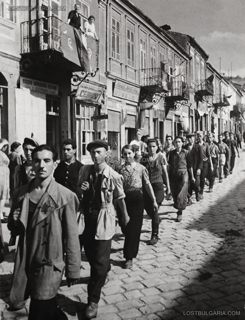Polina Spartyanova
When the Red Army started to advance in Eastern Europe in 1944, the USSR declared war on Bulgaria on 5 September. Three days later, the Bulgarian government called for a truce but it was  overthrown by a military coup on 9 September and Bulgaria fell under Soviet occupation. Today, 70 years after the Red Army occupation, we met with Associate Professor Mihail Gruev, who is the head of the "History of Bulgaria" department at the History Faculty of Sofia University "St. St. Kliment Ohridski" to find out a little more about the consequences of the conquest of the Bulgarian territories by the communist regime. Associate Professor Gruev teaches modern Bulgarian history and over the years, he has specialized in topics such as the totalitarian regime, and society and historical anthropology.
overthrown by a military coup on 9 September and Bulgaria fell under Soviet occupation. Today, 70 years after the Red Army occupation, we met with Associate Professor Mihail Gruev, who is the head of the "History of Bulgaria" department at the History Faculty of Sofia University "St. St. Kliment Ohridski" to find out a little more about the consequences of the conquest of the Bulgarian territories by the communist regime. Associate Professor Gruev teaches modern Bulgarian history and over the years, he has specialized in topics such as the totalitarian regime, and society and historical anthropology.
What were the motives for the Red Army occupation of Bulgaria?
At that time, the Red Army was chasing the German troops to Berlin, thus passing through a large part of Europe. Bulgaria was an ally of the Third Reich from 1941 almost to the time when the Red Army entered its territory. The government of Ivan Bagrianov declared neutrality as late as 26 August 1944, although the country did not officially leave the Tripartite Pact. Thus, the Prime Minister tried to allow the German troops to retreat from the country in order to prevent its territory from turning into the scene of the epic clash between the two hostile forces. The Soviet government did not perceive this as sincere neutrality, believing that Bulgaria continued to support the Germans in this way. This was the main argument for the Soviet Union to declare war on Bulgaria on 5 September.
Generally, the policy of the Bulgarian government at that time aimed to avoid the involvement of Bulgaria in this global conflict, which was why the country did not send troops to the Eastern Front. The Bulgarian state declared a symbolic war on England and the United States but, with the start of the bombing of its territory by enemy planes, it appeared that it was not so symbolic.
During the Red Army occupation of Bulgaria, were there cases of robbery and rape in the country, as in the other occupied countries?
The Soviet troops and the Third Ukrainian Regiment in particular were instructed that they would invade an enemy country. However, they actually behaved more decently compared to Germany or other allies of the Reich. There were cases of rough vandal acts but the fact is that the Soviet authorities were trying to prevent them by shooting those who were involved in such acts. It was very typical for the Red Army occupation of Bulgaria that the Soviet soldiers drank on a mass scale, and the impressions of the Bulgarians, who had to live together with them, were the same as well. In the city of Burgas, for example, there was a case when nearly one hundred people from the Soviet army poisoned themselves having been drunk with alcohol of poor quality but this was not announced to their families for a variety of reasons. They were informed that those soldiers died in performing their civic duty. I am referring to this case to illustrate the relationships between the Red Army and the local population, and the nature of the Soviet occupation of Bulgaria.
Is there data on how much the Red Army occupation cost the Bulgarian state?
The Red Army occupation officially lasted three years, from September 1944 to December 1947. In historiography, there is no serious research on how much the Soviet occupation cost Bulgaria, but there is one study indicating that the maintaining of the army during those three years cost the state 133 billion leva, as it was the responsibility of the Bulgarian side under the peace agreement. The question is what lay behind these 133 billion leva, as the inflation rate was extremely high at that time and the Bulgarian currency was unstable. It is difficult to determine the overall cost of the Soviet occupation of Bulgaria, as the country made available to the Soviet Union its railways, water vessels, airports and its entire infrastructure, free of charge, again under the peace agreement.
In your opinion, who contributed towards the establishment of the communist regime in  Bulgaria the most? Was it the Red Army or the partisan movement?
Bulgaria the most? Was it the Red Army or the partisan movement?
Of course, it was the Red Army. Partisans are a collective conception, as it included the entire human armed potential of illegal Communist Party activists who were fighting to overthrow the government. They were no more than 7,000 in number and this group could not seize power alone. The regular Bulgarian army was in a state of mobilization and it numbered around 300,000 people, there also were separate gendarmerie and police units, and the forces were incommensurable. In this sense, the action of 9 September was possible due to the Soviet occupation, as the Red Army had begun to invade the country a day earlier. The coup was carried out in terms of Sofia police neutrality that was agreed in advance on the one hand and in terms of the circumstances relating to the crumbling of the old state machine as a result of the ongoing Soviet occupation of the country on the other.
Why did the Red Army stop the occupation in Bulgaria, without entering Greece, where the Communist resistance at that time was much stronger than in Bulgaria?
In all talks between the allies of the anti-Hitler coalition, Churchill did not fail to focus on the priority of the British interests in Greece - it was no coincidence that the immigrant Greek government was in London. This was a verbal agreement between the Big Three. The initial plans of Churchill were for landing in the Balkans not in Normandy, which would allow the allies to reach Berlin faster and would prevent the Red Army from entering the Balkans. However, Stalin eventually insisted on the landing in Normandy, as it would give him more opportunities to move around Europe. Roosevelt accepted the thesis of Stalin and that refusal to support the British position to open a second front in the Balkans partly predetermine the Soviet occupation of the rest of the peninsula, but not of Greece. At that time, the Soviet foreign policy did not plan a Red Army invasion in Greece.
These verbal agreements were confirmed at a meeting between Churchill and Stalin in Moscow in early October, which later became famous for the napkin with the percentage agreement on the influence that Britain and the Soviet Union would exert on Central Europe and the Balkans. During this formal meeting, the two leaders agreed on the impact that the two great powers in Europe would have after the war and under this agreement, Greece was supposed to be subjected to 90% British influence and 10% Soviet.
How important was Bulgaria for the balance of powers in the region?
I would not say that the country was very important at that time. Once the victorious countries returned Thrace to Greece and interrupted Bulgaria’s access to the Mediterranean Sea, the country no longer had a special geopolitical importance in this region.
In your opinion, what would the fate of Bulgaria have been if the Red Army had not entered it?
 Bulgaria's situation would have been very similar to that of Greece. Probably it would have been subjected to a stronger British influence in the post war years, when the focus of the Truman Doctrine was to prevent the expansion of communism in Europe. Subsequently, in the following decades, this influence in its purely military aspect was reduced, leaving behind a multi-party political system, albeit with many defects associated with the Balkan nature, but it was however very different from the totalitarian dictatorship that Bulgaria experienced.
Bulgaria's situation would have been very similar to that of Greece. Probably it would have been subjected to a stronger British influence in the post war years, when the focus of the Truman Doctrine was to prevent the expansion of communism in Europe. Subsequently, in the following decades, this influence in its purely military aspect was reduced, leaving behind a multi-party political system, albeit with many defects associated with the Balkan nature, but it was however very different from the totalitarian dictatorship that Bulgaria experienced.
70 years later, could we say, from a historical point of view, whether Bulgaria could have avoided the occupation and how?
I do not think so. The situation in the world at that time was such that the Soviet occupation was almost inevitable. The only chance in my opinion was if the front that I already mentioned was in the Balkans not in Normandy. This would mean that the Allies would have moved faster in the north, isolating the Red Army to the Danube River. However, history does not look with favour on the "if" approach because for us it is more important what happened, not what could have happened under certain circumstances.